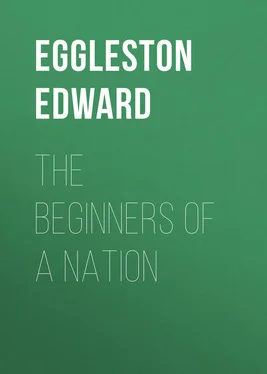Edward Eggleston - The Beginners of a Nation
Здесь есть возможность читать онлайн «Edward Eggleston - The Beginners of a Nation» — ознакомительный отрывок электронной книги совершенно бесплатно, а после прочтения отрывка купить полную версию. В некоторых случаях можно слушать аудио, скачать через торрент в формате fb2 и присутствует краткое содержание. Жанр: История, foreign_antique, foreign_prose, на английском языке. Описание произведения, (предисловие) а так же отзывы посетителей доступны на портале библиотеки ЛибКат.
- Название:The Beginners of a Nation
- Автор:
- Жанр:
- Год:неизвестен
- ISBN:нет данных
- Рейтинг книги:4 / 5. Голосов: 1
-
Избранное:Добавить в избранное
- Отзывы:
-
Ваша оценка:
- 80
- 1
- 2
- 3
- 4
- 5
The Beginners of a Nation: краткое содержание, описание и аннотация
Предлагаем к чтению аннотацию, описание, краткое содержание или предисловие (зависит от того, что написал сам автор книги «The Beginners of a Nation»). Если вы не нашли необходимую информацию о книге — напишите в комментариях, мы постараемся отыскать её.
The Beginners of a Nation — читать онлайн ознакомительный отрывок
Ниже представлен текст книги, разбитый по страницам. Система сохранения места последней прочитанной страницы, позволяет с удобством читать онлайн бесплатно книгу «The Beginners of a Nation», без необходимости каждый раз заново искать на чём Вы остановились. Поставьте закладку, и сможете в любой момент перейти на страницу, на которой закончили чтение.
Интервал:
Закладка:
His story of his own life. According to Smith's own narrative, he was robbed and shipwrecked at sea; he slew three infidel champions in single combat and cut off their heads, just for the amusement of the ladies; he was made captive by the Turks and escaped by slaying his master with a flail; he encountered pirates; in the plunder of a ship he secured by the grace of God a box of jewels; and, to round off his story, he was beloved in romance fashion by a fair Turkish lady, one Tragabigzanda; befriended by a Russian lady, the good Calamata; and, later, was snatched from the open jaws of death by the devotion of the lovely Princess Pocahontas, daughter of King Powhatan, of Virginia. What more could one ask? Here are the elements of all the romances. But, to crown all, he emulated the misadventure of the prophet Jonah, and he even out-Jonahed Jonah. He got ashore by mere swimming without the aid of a whale, when cast overboard by Catholic pilgrims to appease a tempest. Never any other wanderer since the safe return of Ulysses passed through such a succession of marvelous escapes as this young John Smith. His accidents and achievements, even without exaggeration, were fairly notable, doubtless, but they are forever obscured by his vices of narration.
Interest in colonization. By the time he was twenty-eight years old this knight-errant had pretty well exhausted Europe as a field for adventure. Soon after his return to his own land he found the navigator Gosnold agitating for a new colony in Virginia, the scene of Ralegh's failures. That being the most difficult and dangerous enterprise then in sight, nothing was more natural than that Smith should embark in it. From this time to the end of his life this really able man gave his best endeavors to the advancement of American colonization. His character. In counsel he was accounted wise, and his advice was listened to with more than common deference in the assemblies of the Virginia Company as long as the company lasted. In labor he was indefatigable, in emergencies he proved himself ready-witted and resourceful. His recorded geographical observations are remarkably accurate considering his circumstances, and his understanding of Indian life shows his intelligence. His writings on practical questions are terse, epigrammatic, and wise beyond the wisdom of his time. But where his own adventures or credit are involved he is hardly more trustworthy than Falstaff. His boasting is one of the many difficulties a historian has to encounter in seeking to discover the truth regarding the events of an age much given to lying.
VII
Smith's exploration and trading. On Smith principally devolved the explorations for a passage to the Pacific and the conduct of the Indian trade. He was captured by the Indians in the swamps of the Chickahominy and carried from village to village in triumph. Contriving to secure his release from the head chief, Powhatan, he returned to Jamestown. Nothing could have suited better his bold genius and roving disposition than the life he thereafter led in Virginia. A. D. 1607, 1608. He sailed up and down the bays and estuaries, discovering and naming unknown islands, ascending great unknown rivers, cajoling or bullying the Indians, and returning to his hungry countrymen at Jamestown laden with maize from the granaries of the savages. Oxford Tract, passim . Smith and his companions coasted in all seasons and all weather in an open boat, exercising themselves in morning psalm-singing and praying, in manœuvring strange Indians by blustering or point-blank lying, and in trying to propagate the Christian religion among the heathen – all in turn as occasion offered, like true Englishmen of the Jacobean time. Gen. Hist passim .
His narrative. Captain Smith's earlier accounts of these achievements in Virginia seem to be nearer the truth than his later Generall Historie. As years rolled on his exploits gained in number and magnitude in his memory. The apocryphal story of his expounding the solar system by means of a pocket compass to savages whose idiom he had had no opportunity to learn is to be found only in his later writings. He is a prisoner but a month in the narrative of the Oxford Tract of 1612, which was written by his associates and published with his authority, but his captivity had grown to six or seven weeks in the Generall Historie of 1624. His prosaic release by Powhatan had developed into a romantic rescue by Pocahontas. Two or three hundred savages in the earlier account become four or five hundred in the later. Certain Poles assist him in the capture of an Indian chief in the authorized narrative of Pots and Phettiplace. In the later story our hero performs this feat single-handed. A mere cipher attaches itself sometimes to the figure representing the number of his enemies, who by this simple feat of memory become ten times more redoubtable than before.
His service to the colony. But it does not matter greatly whether the "strangely grimmed and disguised" Indians seen by Smith at one place on the Potomac, who, according to the story, were shouting and yelling horribly, though in ambuscade, numbered three or four hundred as in one account, or three or four thousand as in his later story. Oxf. Tract, p. 32. Gen. Hist., bk. iii, ch. v. To Captain Smith remains the credit of having been the one energetic and capable man in those first years – the man who wasted no time in a search for gold, but won from the Indians what was of infinitely greater value – the corn needed to preserve the lives of the colonists. In an open boat, with no instrument but a compass, he explored and mapped Chesapeake Bay so well that his map was not wholly superseded for a hundred and forty years. Historie of Travaile into Virginia, p. 41. Even Wingfield, who had reason to dislike Smith, recognizes the value of his services; and Strachey, who had every means of knowing, says that "there will not return from" Virginia "in hast any one who hath bene more industrious or who hath had (Captain Geo. Percie excepted) greater experience amongst them, however misconstruction maye traduce here at home."
Smith overthrown. During the autumn of 1608 and the winter following Captain Smith was sole ruler of Jamestown, all the other councilors having gone; but the next spring there arrived five hundred new colonists inadequately provisioned, and under two of the old faction leaders who were Smith's mortal enemies. These were the visionary and turbulent Archer and his follower Ratcliffe. A. D. 1609. Smith got some of the newcomers to settle at Nansemond, and others took up their abode near the falls of the James River. 11 11 Whether Smith was injured by gunpowder and required treatment, as he asserts, or was sent home under charges, has been matter of dispute. Both accounts are correct, as is shown by the testimony of an important manuscript at Petworth House, in Surrey, which I was allowed to examine by the courtesy of Lord Leconsfield. It is from the pen of George Percy, a brother of the Earl of Northumberland, who was chosen to succeed Smith on his departure from the colony. It is not the narrative from which Purchas makes extracts, but a sequel to it. The title is "A Trewe Relacyon of the pceedinge and Ocvrrentes of momente wch have hapned in Virginia from the Tyme Sr Thomas Gates was shipwrackde vpon the Bermudes Ano. 1609 vntill my depture ovtt of the country wch was in Ano Dni 1612." It is a quarto of forty-one pages. Percy was a man of courage, but his own narrative in this little book shows that he had no qualification for the office of governor except the rank of his family. His ill health is made an excuse for his inefficiency, but Dale's letter of May 25, 1611, shows that even the horrible events of Percy's first government had not taught him to plant corn when again left in charge. Percy naturally resents Smith's boastfulness, and bluntly accuses him of laying claim to credit that was not his. The charge that Smith, unable to control the unruly settlers at the Falls under West, advised the Indians to attack them, is supported by Percy; and a very different charge, that he stirred up the Indians to assassinate West himself, appears at a later time in Spelman's Relation, a tract that bears abundant internal evidence of the writer's mental inability to speak the truth. Percy himself relates that the Indians were already hostile to West's party, and that they had wounded and killed some of West's men in resentment of their wanton outrages. See also the account in the Oxford Tract, with the signatures of Pots and Phettiplace, for Smith's version of the affair. "Bloody-mindedness" seems not to have been a trait of Smith. But the exigency was a terrible one, for death by starvation was already impending, and only the restoration of discipline at any cost could have saved the colony from the horrible fate it met. Such a course would not have done much violence to the notions of the time, and would have found precedents in the various plots against the lives of Smith, Wingfield, and others in the colony. It is quite probable, however, that there is no truth in the story. The violent hatred of the factions will account for the suspicion.
After much turmoil Smith was disabled by an accident, and his enemies contrived to have him sent home charged, among other things, with having "incensed" the Indians to assault the insubordinate settlers under West near the falls, and with having designed to wed Pocahontas in order to secure royal rights in Virginia as son-in-law to Powhatan.
Интервал:
Закладка:
Похожие книги на «The Beginners of a Nation»
Представляем Вашему вниманию похожие книги на «The Beginners of a Nation» списком для выбора. Мы отобрали схожую по названию и смыслу литературу в надежде предоставить читателям больше вариантов отыскать новые, интересные, ещё непрочитанные произведения.
Обсуждение, отзывы о книге «The Beginners of a Nation» и просто собственные мнения читателей. Оставьте ваши комментарии, напишите, что Вы думаете о произведении, его смысле или главных героях. Укажите что конкретно понравилось, а что нет, и почему Вы так считаете.












